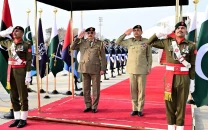Indo-Pak relations: Grassroot contact between rivals key to peace
Speakers say people are the key to building trust between Indo-Pak.

People-to-people contact would be the biggest Confidence Building Measure (CBM) between archrivals India and Pakistan. At present, however, neither of the two appear ready to kickstart the process despite acknowledging its value to both countries.
This was the crux of deliberations between a number of academics, think tank scholars, retired civil and military officers, prominent journalists and politicians during a seminar on “Reflecting on Thimpu: Future of Pakistan-India Relationship” organised by the Centre for Research and Security Studies Islamabad in collaboration with the United States Institute of Peace.
A majority of people who commented agreed that while Kashmir was, and still is an important issue, terrorism is now the main stumbling block for a process of CBMs between the two countries.
“Thankfully, India has realised that even terrorism should not impede the process,” said a hopeful Aziz Ahmed Khan, Pakistan’s former ambassador to India. He appreciated that both South Asian nations had agreed to reinstate the dialogue process after the Mumbai attacks in November 2009.
“Both countries had already agreed on a formula for settlement of the Siachen and Sir Creek issues, only implementation was missing,” said Khan.
The staunchest supporter of contact between people of the two nations was noted Indian journalist Reza-ul-Hassan, a correspondent for the Press Trust of India. “Until people-to-people contact resumes, there is no hope for the reinstatement of CBMs anytime soon,” said Hassan.
His idea of such a contact was not limited to exchange of artists, celebrities or even mainstream journalists. “If a journalist had to be sent to India, he or she should be from the rural areas of Pakistan so that on his return he could tell farmers that water scarcity is a problem for Indian farmers too,” he suggested, referring to what he called a misperception among many Pakistanis about India deliberately stopping their share of river waters.
While PML-N leader Ahsan Iqbal pointed out the potential for economic cooperation between India and Pakistan, a noted American expert on Pakistan, Dr Marvin Weinbaum pointed to another area of cooperation. Afghanistan.
“A failed Afghanistan is a dangerous Afghanistan for everyone,” said Weinbaum, instantly provoking a flurry of comments from the audience who felt that a civil war could follow if the United States fails in Afghanistan as certain factions in the Pakistani establishment still believe in the notion of strategic depth and were ready to capitalise on this possibility.
His opinion that Pakistan considers Indian presence in Afghanistan as encirclement though India is only playing a contributory role was also confronted by many audience members who believed that Pakistan’s fears of the Indian role in Afghanistan was legitimate.
Published in The Express Tribune, March 12th, 2011.



















COMMENTS
Comments are moderated and generally will be posted if they are on-topic and not abusive.
For more information, please see our Comments FAQ